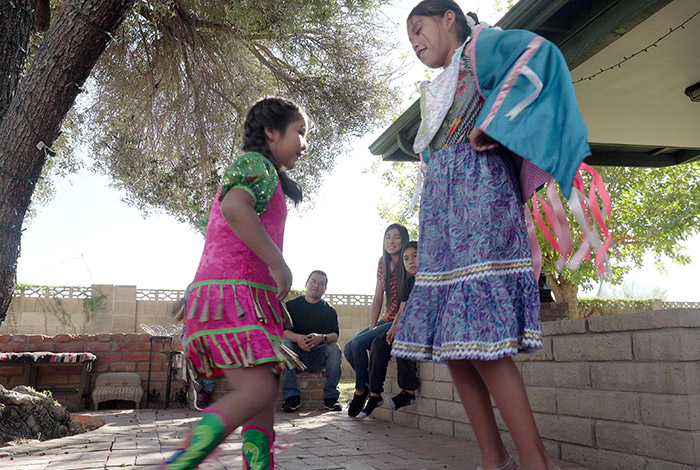Culture and Heritage are Key to Tribal Community Health
11/22/2021

As part of Native American Heritage Month, »‚»‚¥´√Ω recognizes the rich history, culture and contributions of Native Americans, including our employees, health partners, and the tribal communities that we serve.
Providing access to culturally sensitive, high-quality healthcare is an essential part of »‚»‚¥´√Ω‚Äôs work with members. Among our state-based health plans, five of them operate teams that coordinate with Native American communities and governments to address cultural, healthcare, and social services for tribal members. Ã˝
At »‚»‚¥´√Ω‚Äôs Arizona subsidiary, Arizona Complete Health, over 9,500 members live in tribal communities. Sheina Yellowhair is supervisor for Tribal Program Development, and she says that among her health plan‚Äôs Native American members, a person‚Äôs traditions and cultural beliefs are an integral part of their health. ‚ÄúWe know that for the American Indian community members, it is very important for us as healthcare providers to understand our member‚Äôs history, culture, and heritage, and to make these the cornerstones of our care plans,‚Äù she added.
Many Native Americans believe in a holistic approach to health, aligning harmony of the mind, body, and spirit. In this tradition, illness implies an imbalance between the person and their universe. Additionally, many language and cultural differences contribute to barriers to care, as do geography and access to care facilities.
In North Carolina, an estimated 6,000 Native American members receive managed care services from WellCare of North Carolina, where Jessica Beach serves as the Manager of Tribal Relations. “There are 100 counties in North Carolina, 80 of them rural and 20 of them are considered urban. Tribal communities in North Carolina are primarily located in rural communities. This fact makes access to culturally responsive care a challenge,” says Beach. "When our members are required to travel long distances for specialty care or in-patient stays, it can be challenging for family support to also travel. These are issues we know will ultimately impact health outcomes for our members."
Beach saysÃ˝WellCare of North Carolina works with Native American communities to address health disparities, such as maternal-child mortality and morbidity, harmful tobacco use, lack of critical health screenings for cancer, and other chronic diseases that disproportionally impact tribal communities.Ã˝ "Strategic partnerships are critical to our ability to connect people to healthcare," Beach said. Ã˝
In collaboration with the Southeastern American Indian Cancer Equity Partnership,Ã˝WellCare of North Carolina has helped to develop culturally responsive materials for tribal members, aimed at increasing Human Papillomavirus vaccinations and prostate cancer screenings.
Peer-to-peer training is one effective tool that Arizona Complete Health uses to combat barriers to care in Native American communities. “Since 2017, we have sponsored peer support training for Tohono O’odham Nation, partnering with White Mountain Apache Tribe and Tohono O’odham Behavioral Health, to deliver peer support training and certification for a total of 40 tribal staff,” says Yellowhair.
As the global COVID-19 pandemic spread, healthcare vulnerabilities in Native American communities have been exasperated. According to the Indian Health Services, an agency within the Department of Health and Human Services, COVID-19 infection rates were 3.5 times higher for American Indians and Alaska Natives, compared to non-Hispanic whites. Tribal community members were also four times more likely to be hospitalized as a result of COVID-19 and have experienced higher rates of mortality at younger ages.
“Our work in tribal communities is very much an in-person approach, and COVID-19 made that impossible,” Beach said. “The health plan had to be innovative in how we approached engagement with Tribal communities, and we also had to be aware of how much loss and trauma COVID-19 has caused in our communities.”
COVID-19 challenges for Arizona Complete Health’s tribal community members also exposed an alarming reality according to Yellowhair. “COVID-19 brought to light many infrastructure challenges that tribes have historically faced, including a lack of running water, lack of electricity, sporadic cell phone coverage, and limited access to broadband internet,” she says.
Throughout the COVID-19 Pandemic, both Arizona Complete Health andÃ˝WellCare of North Carolina provided personal protective equipment (PPE) supplies to healthcare partners and tribal-first responders, as well as food, gift cards, and housing support to tribal communities. ‚ÄúThroughout the pandemic, we have and continue to partner with tribal organizations to identify how we can be a resource beyond our membership, but for tribal communities as a whole,‚Äù said Beach.Ã˝